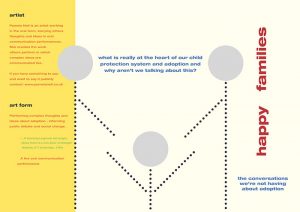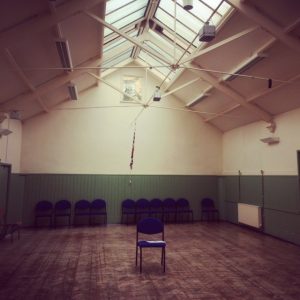This is a partial transcript typed up by Sarah Phillimore from the audio recording of the discussion at the end of CPConf2016 which took place at Birmingham on June 3rd 2016. Some parts are incomplete as the recording was not always audible, but hopefully it represents a reasonably good transcription of what was said.
The discussions were interesting and wide ranging but some clear themes emerged: what we are doing now doesn’t work. We need to change our approach and allow social workers and parents to form relationships of trust. We can’t ignore the impact of poverty and lack of access to services as part of the problem. Suggestions for improvement were to support social workers to feel safe to acknowledge when things weren’t working, bolster the role and independence of the IRO, consider an end to rationing of services, offer more support to young care leavers and all children generally, provide tools to learn about good parenting as part of the national curriculum.
PANEL MEMBERS
Debbie Singleton co-chair of the Association of Lawyers for Children (ALC)
Lisa Wolfe – psychologist
Dr Devine – academic and barrister at UWE
Anna Gupta – Senior Lecturer at Royal Holloway
Cathy Ashley – Chief Executive of the Family Rights Group
Brid Featherstone – Professor at Huddersfield University
Andy Bilson – Academic
Lucy Reed – barrister and chair of the Transparency Project
Jerry Lonsdale – McKenzie Friend and activist
Louise Tickle – journalist
Maggie Siviter – social worker
Surviving Safeguarding – parent and activist
Sarah Phillimore – barrister and trustee of the Transparency Project
Brid Featherstone
There are two things I would like to talk about. First, the British Association of Social Workers (BASW) has launched an inquiry into role of social workers in adoption. BASW is now the main professional body across the UK representing social workers – it’s a particularly important organization, given the collapse of the College of Social Work. It has commissioned an inquiry with focus on ethics and human rights. Anna (Gupta) and I bid to run inquiry independently and were awarded bid.
Why? We are interested in looking across the UK and the focus on adoption and what it is doing on practice of social workers. We are defining ethics as not just what social workers do but what they ought to do – they ought to take control of their own ethics and asking are they the right thing? We are giving a forum to people to comment on whether the role of social workers in adoption is ethical. In terms of human rights, we are really concerned to look at whether all families are getting the economic, political and social rights they need.
It will be all up on www.basw.co.uk, and also an email inbox for you to write into us. The way you can directly contribute is to the call for evidence. You can write to us and tell us about your experience. It is open to all, all the people in this room basically to give their views. It has been approved ethically by University of Huddersfield so there are strict safeguards. We will be careful and thoughtful about what you tell. Us. Particularly interested to give social workers the opportunity to talk in anonymised way. We will close call for evidence at end of September.
Will also talk to young people, lawyers and judges. Do come to talk to Anna and I.
Second thing: the Children and Social Work Bill going through Parliament. I speak as former social worker; I was here last year (at CPConf2015) and know how worried you are about what’s going on in social work. Some provisions in Bill that may make our lives even worse. Worst-case scenario, Government will take back regulation of social workers under its control – not just who can practice but the content of courses. There could be a lot of control of what we can and can’t teach.
Worries that this might make things worse. Lots of lobbying and campaigning. Look at website of Community Care and Celtic Knot article. Raising awareness.
Cathy Ashley CE FRG
We are instrumental in introducing family group conferences in this country – now ¾ of LA have some family group conference service of some kind. Some small some larger, but its about giving families more control about drawing up plan to address joint concerns with social worker.
The (Children and Social Work) bill itself is quite a hotch potch and it is worth having a look. Because it is a hotch potch it means the scope of the bill is actually quite broad. We are drawing up amendments under Your Family Your Voice Alliance (YFYV) in ways it can be improved in relations to parents and families.
I would be very keen to get your support as individuals or organizations – the more that endorse YFYV the more likely the amendments are to be listened to. And to the lawyers out there if you would like to help us draft I would very much welcome that!
Focus of amendments – care leavers who are pregnant or young parents, amend so there is a duty in relation to advice, assessment and support, in relation to their parenting role. This comes out of work we have been doing with young parents whose children are at risk of being removed, even if there is support for them as care leavers, not recognizing they also need support to keep their children with them.
Second, we are wanting to push that fostering for adoption is not used in section 20 cases, so you don’t get situations which are currently occurring when a parent has no legal advice, no judicial scrutiny but child is placed with potential adopter and it is much harder for parent to get child back due to status quo issues. In terms of ensuring fair process, essential it is not used re accommodated children.
Third point, we would particularly value your advice is that we want to try to push an amendment that is about ensuring parents are offered support if child is removed from them. That is particularly pertinent to Karen Broadhurst’s research that shows that children are being sequentially removed from new mothers in the system and the space between pregnancies reduces number of children removed.
Amendments re wider kinship care and special guardianship – should be equivalence between support for adopters and special guardians who are also permanently raising a child. We know that it is not perfect for adopters, but challenge idea that depending on which door you go through depends on support you get.
We support extensions of staying put to children in residential care. The Government is suggesting a local offer to care leavers, we think it should be national but other organizations are leading that. The other thing – clauses 15-18 (of the bill) around ‘freedoms and flexibilities’ for LA, in the way it is drafted gives the Sec of State huge powers to exempt LA from primary legislation and regulation and we think that is seriously worrying in terms of family rights and the way it is drafted needs very serious amendment. Hasn’t had that much attention. Talks of transfer of functions to trusts. The way it is currently drafted could end up with LA being exempt from core legislation.
Georgina CEO of Whistleblowers UK – Thank you to organizers of the conference. If the child protection isn’t fit for purpose where do we go from here? Heard input of people worried about parents and children but what are you doing to protect yourselves. How many of you in this room who are social workers … when something doesn’t go well and doesn’t go right and you need to speak out how do you trust the system. If the culture is “I want to say something but I can’t I will lose my job” how can you protect parents and children? No mechanism to get redress. My question to all of you is, going forward, what does ‘good ‘ look like. If you don’t feel safe, how can you protect others?
Maggie Siviter – you are right, echoes what I said this morning. It does worry me. Where is the learning, where are the collective voices of social workers united with parents and children? Often we echo and reflect what is being said. Why aren’t we heard before we have to blow the whistle, before the system harms people? I don’t think we are particularly well looked after as professionals. I don’t think we are trusted. We are in institution that militates against us being trusted. I have been ‘set up’ against a parent just doing my job. Been allocated a child I have to assess with sole intention of removing child. How am I going to be able to support that family to keep child. Sets me up in conflict with family immediately.
When Victoria (Teggin) was talking earlier about mediation I know from experience, the hostility has started before mediation. I tweeted that when you are trying to protect a child the best way to do that is to work with the family. When you get to point that this isn’t working for children you already have family on board – frank open relationship. Where to now? It takes really skills and experience. I don’t think we provide our newly qualified SW with environment to do that. Don’t think we bring in skilled practitioners. Families say I am not having that social worker, and managers saying you are not getting another one. Where does that leave families? That is actively working against what family needs. We need a root and branch reform of social work profession.
“Social Work Tutor” is joining in discussion with that about reforming social worker. Social workers need to take ourselves by the scruff of the neck.
Audience member raises question about IRO – What is role of IRO – that is good question. Children historically left languishing in care for years with no one asking if we needed to look after child. Reviews brought in to ask question every six months. IRO has statutory responsibility to chair LAC meetings as they are independent of reviewing process. I have issues with independence bit as I have come into conflict when I wore independence hat and got told to toe the party line.
Audience member – I was given ficitious address for an IRO.
Maggie Siviter – that is matter for complaint.
Being a whistle blower I know you can complain until blue in face but you won’t be heard.
Audience member – they tried to injunct me
MS I despair. Contact IROs directly
Audience member – you can’t get hold of IROs.
Lucy Reed – absence of IRO noticing problems in process is big recurring issue. I ask what lawful basis child removed and IRO doesn’t notice. Some good IROS out there but also some who didn’t notice and were criticized. Human Rights Act (HRA) claims against IROS – there is a real issue here, I suspect it will be coming up. Judges are discovering that dealing with HRA claims are causing listing issues. But they are important for all sorts of reasons.
Maggie Siviter – Isabelle Trowler quoted in Community Care as considering removing IROS – but they should be the backstop for all areas of child decision making. Come under quality assurance department in LA. I have frustration about lack of independence. I have big issues and fallen foul of requirement to subject care plans to scrutiny and I have been victimized for doing my job – big tension.
The independence is that which is granted, it is not inherent. Only way to get true independence is if LA is committed to letting IRO having a voice.
Jerry Londsdale – the regulations set out role of IRO, the LA duty to appoint.
Alice Twaite – how do we get beyond just talking about problems, how do we do better?
Lucy Reed – the fact we trending on Twitter and visibly talking – parents to social workers, and we are not lobbing things at each other, the fact that this is being seen is really important. It’s not the end, it’s the beginning.
Alice Twaite – is there a way for us to be more consistent in sharing information?
Sarah Phillimore – that is going to be the aim of ‘The Hub’ – we have to do better, we need a focus not just getting together once a year and going round in circles. This is such a multi discipline issue; if we don’t all come together we won’t have a solution. If you come here today assume you are interested in continuing conversation so please sign up.
Anna Gupta – it is also about austerity and the political context and we need to say this. It is not just up to social workers, they work in context and it is a really difficult time out there. We should not be cutting early years services. I was trying to find youth worker in Brixton – impossible. Youth services are decimated. Not working (APPLAUSE)
Audience member … Health Visitors have suffered as well. Necessary to have a key worker, somebody that they can work with and trust. We have race to bottom with lack of funding. Inward looking approach – we need to open out.
Lucy Reed – if people here who have points they want to make, we will host that on Transparency Project website. If we could get a collection of things that you found useful that would help.
Audience Member – on the point of austerity – I am an adoptive parent who went from being part of the solution to part of the problem Probably a million pounds spent on trying to break up my family. Not succeeded. What was needed was properly thought out respite and therapy. That’s all we needed. 1 million spent is a 20th of adoption support fund for the whole country. I don’t want to hear talk of not enough money.
Lucy Reed – investment in therapy in earlier stage will prevent costs – makes sense to put money in. Its how we get LA to put funds in at particular moment. Money is invested in wrong places (everyone is nodding) Early intervention needed.
Cathy Ashley – I am a bit Pollyannaish. I do think there are some LA senior managers who are really trying to do this differently. One of the things that can be an incredibly pessimistic environment that gives some hope it feels like an increasing number of children’s services recognizing this and looking at how you get children supported. Not the norm across the country I accept that and not the direction from central Government. But we can be ground down by the challenge that faces everyone in this room and families out there. I do think we need to be thinking through the Transparency Project, YFYV and a number of initiatives about how we work in a coalition to change the nature of the debate and show that not only the current way of doing things is punitive but it doesn’t work and is very costly and there are other ways of doing it that are more humane (APPLAUSE)
Student – how should society protect children – collectivist approach, or should we license parents?
Maggie Siviter- I think you have a point – not about licensing parents! But how we teach our children to become parents. How we encourage them to understand what their children will need. We don’t do that very well. Especially children who themselves come from vulnerable backgrounds, we don’t support them well to become parents. You ask valid question.
Brid Featherstone – I couldn’t disagree with you more! (Audience laughter) Last year I talked about our book, Re-Imagining Child protection. We are working on the social model. Want to get rid of term child protection. Start – what do families need to care safely and flourish – money housing, food friends, social capital. People will always suffer. But we start form basic. Don’t start from risk. The reason we are all here is that we have risk monster that is insatiable that we are feeding. Lets stop (APPLAUSE)
Dr Devine – where I am coming from I am a researcher. Trying to keep neutral stance, I see link. Should we be assessing people before they become parents? Link it back to some of comments earlier about austerity and rationing services. This is central to our research. We could go the other way. Resource implication involved in massive number of referrals year on year. If we take point that most of referrals happening at pretty low level of risk.
We have a rationed served provision model in this country. We ration just about everything on basis that it cuts cost. Interventions can happen at primary level such as register with GP, right to HV. Then escalated to secondary interventions that are rationed services.
Question – number of children referred is astronomical. A lot of those families assessed at per capital cost. Most of assessments go no further. No legal requirement having been assessed under section 17 that you will receive services. So my suggestion is that we could we pull back and say instead of referring why don’t why we make secondary tier interventions free at primary level so people not risk assessed to access them.
We could number crunch and work out how much that would save. If one of problems is risk – if we knew parenthood so risky we had 25% children born killed by parents, we would be having a different debate and would need to risk assess everyone. But that is not the case. So it is not rational or reasonable to screen for parenthood. Suggest we go the other way and save money currently spent on secondary model and open up services (APPLAUSE)
Andy Bilson – I had the privilege of working in some very poor countries such as Bulgaria helping them turn around their system. Set up very basic social work. I have seen and evaluated social work practice out there. People go out to the very poorest people to help them with housing. Working with them on health issues and get access to health. How to get access to income. It’s a different source of social worker and is immensely successful. It does not start saying you are bad to your children, its starts from, we see you are struggling and you need help.
If we could turn it around to do this sort of work we would have an entirely different system. This is not a legislative issue. This is about the ‘risk monster’. We should turn back to rights. The state has a duty to support parents to look after children. That is fundamental. Right for parents to receive help from State to look after children. That is what we need to push. Need to work with agencies that want to do something different and get some pilots going. What does change look like and how might it work. Working with Roma community and finding out out what services they needed. Found out how children were in school and talked to schools. Lots of different ways to work – we need to change it. (APPLAUSE)
Audience member – get parenting course in national curriculum. Target it. I am survivor of abuse and I didn’t have the tools to be parent to my children. I came to social services for help and they took my children and used my history against me. If you haven’t got the tools can’t do the job.
Audience member – wouldn’t that encourage teen-age pregnancies?
Sarah Phillimore – we have to start with our children and teach emotional intelligence. See this in issues of domestic violence in relationships. Not teaching children to have sex. We as nation don’t seem to talk about things that are difficult like sex emotion, anger and fear. Have to have self- esteem to love ourselves and that will make us good parents. It was Cameron who removed relationship education from the compulsory curriculum and I think he is a fool (APPLAUSE)
Annie Surviving Safeguarding – I was mother at 16 and I didn’t have a clue. I was abused as a child. My parents were abominable. I was a looked after child. No tools whatsoever. The state had a responsibility to parent me entirely. Not just food water and shelter but love care and attention. I really do believe that one of state responsibilities for looked after children is to teach them about parenting. Lets sow the seeds now, what are we scared of. Give these children life skills not quadratic bloody equations – how to take care of each other, how to love each other – it is bloody common sense. Parenting is key life skill.
Audience member – why teach it before age 16?
Annie – you don’t frame it in terms of sex. It’s about how to be compassionate how to be kind. Teach from reception. It’s got to come from somewhere. It takes a village to raise a child.
Maggie Siviter – parenting isn’t switched on at a certain age. Parenting is about relationships and we are taught about it the minute we are born from our own parents. We are learning all the time. We need to shore that up for children who have adverse experiences. Echo what Annie saying. It’s organic and should be part of our living breathing environment. And when it isn’t it needs to be supported.
Jane Auld NPI – building of brain in first 3 years of child’s life – important to teach teenagers that before they embark on being parents.
Audience member – what about our children now who are growing up with sense of injustice deprived of their parents and grandparents?
Audience member – we lost duty to prevent children coming into care with Children Act. We kept children out of care – now it is more expensive. We need to ring prevention back in, it is the cheapest money to spend. (Applause)
Brid – I am not against parenting classes but it is the poorest children in our society who end up in care. Don’t forget that. Link with deprivation is absolutely central. It is the poorest children who get removed and lose chance to grow up with families (Applause)
Lucy Reed – I am conscious that today has had a lot of information. Started a lot of interesting trains of thought and not finished. But interesting ideas and practical solutions. For those who have started please finish by putting in writing and we will put it on the TP if you can – email us at in**@*********************rg.uk
Thank you very much! (applause)




